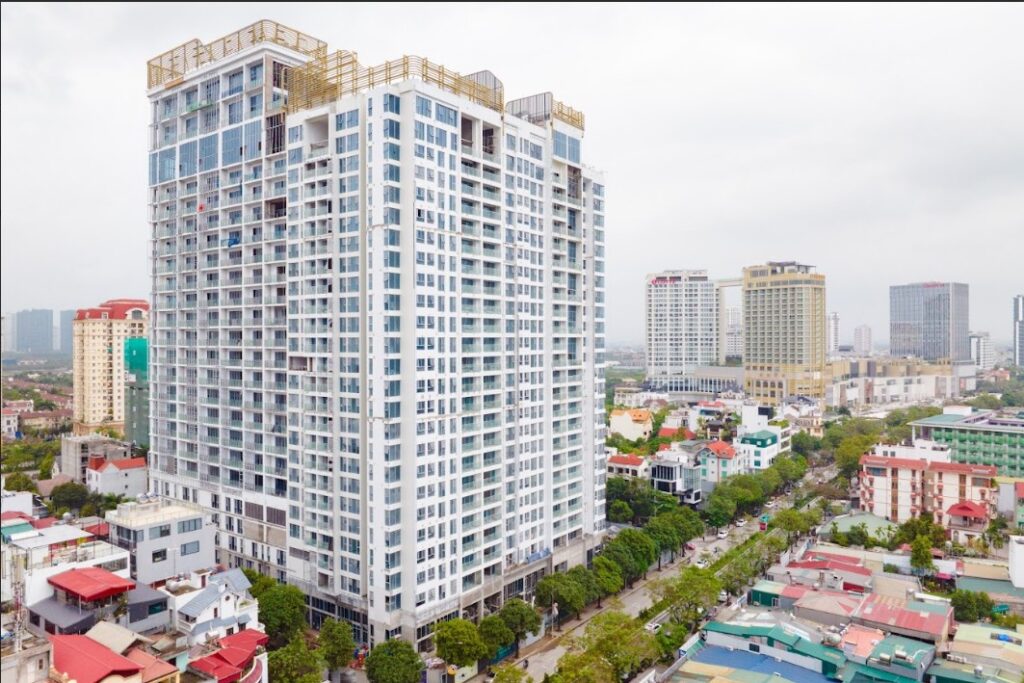The apartment prices in Hanoi have been continuously increasing since the beginning of the year, causing the dream of owning a home to become increasingly distant for many people. Experts warn that if this apartment fever is not addressed, it could lead to ‘chaos’ by the end of the year.
Prices rise for 21 consecutive quarters
Apartment prices in Hanoi have consistently set new records in recent years. As of the first quarter of 2024, the average price of new apartments has reached 59 million VND/m2, marking a 21-quarter consecutive increase. According to market research by Savills, primary (developer) prices in the first quarter of this year were on average 40% higher than secondary prices, driving many older apartment projects to increase in value. This trend has been noted by several research entities. CBRE reports that average prices for projects in Hanoi, both primary and secondary markets, have risen rapidly in the first three months of this year and are gradually approaching apartment prices in Ho Chi Minh City.

“In Hanoi, the majority of new supply in the high-end segment, priced between 60-120 million VND/m2, has driven up primary apartment prices. The average price of new apartments in the capital city has increased by 5% per quarter, significantly narrowing the gap with the Ho Chi Minh City market. This gap is now only 10%, whereas two years ago, primary apartment prices in Ho Chi Minh City were 35% higher than in Hanoi.
Notably, secondary apartment prices (transactions between individuals) in Hanoi recorded the highest annual increase in the first quarter, rising by 17%. The average price of second-hand apartments reached over 36 million VND/m2. This upward trend is evident in most districts of Hanoi, especially in the western areas.
Speaking with VN-Beats, Mr. Nguyen Quoc Hiep, Chairman of GP. Invest, believes that the continuous increase in apartment prices in Hanoi is due to the scarcity of supply. The main reason is that current projects are facing legal obstacles. However, Mr. Hiep argues that apartment prices do not accurately reflect their true value.”

“At the seminar ‘Real Estate Investment Opportunities with the Revised Land Law’ organized by Vietnam Finance magazine on April 12th, economic expert, Dr. Le Xuan Nghia, stated that the Vietnamese real estate market is facing a ‘segmentation crisis’. Two years ago, the Prime Minister highlighted this situation and proposed a plan to ‘rescue’ the market by promoting social housing with a 120 trillion VND loan package.
However, Dr. Nghia assessed: ‘We cannot rely on banks to promote social housing construction. The disbursed credit package has not reached 1% after one year. The social housing and affordable housing segments are almost failing, while the commercial apartment segment is experiencing a frightening price increase.’ Dr. Nghia believes that this situation demonstrates ‘a regression in the government’s strategy on housing market management’.
The expert reiterated warnings about the Vietnamese real estate market when ‘the apartment segment alone has a bubble’, and supply and demand are no longer balanced or are moving in opposite directions due to reduced supply. Dr. Nghia believes that without warnings from the present and without promptly implementing the Land Law to incorporate other segments, the apartment segment will eventually fall into chaos. This will happen from now until the end of the year, affecting government policies and strategies.
Dr. Nghia evaluates that the new Land Law creates opportunities to address existing issues in the Vietnamese real estate market but needs to be properly and vigorously communicated regarding the social housing and affordable housing segments. In addition, there is a need to expedite legal procedures and develop new housing policies for the poor to mitigate the consequences.
Economic expert, Associate Professor Dr. Dinh Trong Thinh, stated that apartment prices have surged by 30-40% recently. Many developers preparing to launch are also raising selling prices. He warned that this would lead to an ‘apartment price bubble’, exacerbating the ongoing segmentation crisis in the market.
Dr. Thinh recommended that regulatory authorities need to thoroughly remove legal obstacles, increase the number of products in the market, and enhance competition. ‘Social housing, affordable housing is an important solution to change the current segmentation crisis,’ Dr. Thinh stated.”
See more real estate news.